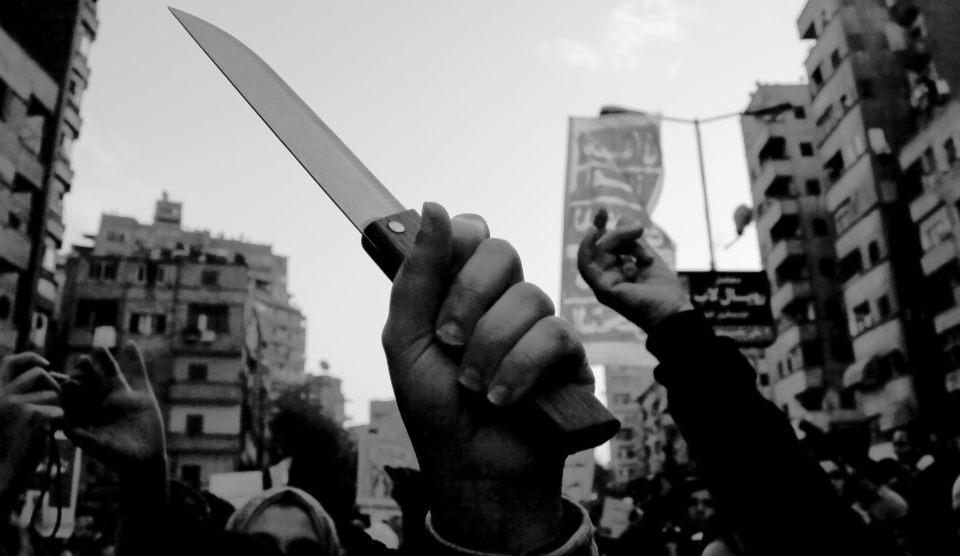
Image source: Wikimedia commons. Woman holding knife, protest and march against street harassment in Cairo, Tahrir Square, 6 Feb 2013. Photograph by Gigi Ibrahim
Today I woke up to a tweep that I am following saying: “since yesterday i received 40+ extreme hate messages on curious cat, i am talking the high end of the curse language , and it's somehow scary and also why?” (@BassantMaximus). This is no news, many women in Egypt are facing sexual and gender based violence online, as they face it on daily basis offline, and it’s not only about women speaking of taboos (to give just one example: Ghadeer Ahmed), but also other intersections play a role.
This is no news, many women in Egypt are facing sexual and gender based violence online, as they face it on daily basis offline, and it’s not only about women speaking of taboos (to give just one example: Ghadeer Ahmed), but also other intersections play a role.
Fatou Sakory (@FatmaEmam) identifies herself on twitter as “Nubian Egyptian, 3rd generation of internally displaced ethnicity. Human Rights researcher & translator. Interests are gender, religion, culture & race”. You cannot access Fatou’s blog in Egypt without a VPN service because it is blocked, at the moment there are at least 496 blocked websites in Egypt (Association for Freedom of Thought and Expression, Egypt May 2018). Fatou writes regularly on the Nubian cause since 2005, and for her tweets on Nubia and racism in Egypt she receives online attacks.

Something I get badly attacked and in a dirty way because I speak about Nubia and racism. Where can we draw the fine line between freedom of expression and disseminating hate and racist speech? - @fatmaemam, 8 October 2017

The summary of incitement and belittling just for speaking about Nubia is long. The stupidest comment was ‘if you don’t like Egypt get the hell out of here you piece of shit’, and here comes the big BLOCK” @fatmaemam, 5 October 2017
Fatou is a courageous woman who co-founded an Egyptian feminist organization before the start of the Egyptian revolution (Nazra for Feminist Studies) and still holds an important voice in the intersection of feminism with religion, and with race. Her contribution to the small space of Islamic feminists in Egypt is not little, however, Fatou is known to be THE Egyptian feminist who speaks about race and racism in Egypt. She engaged with the process of writing the Egyptian constitution with regards to the Nubia issue, she wrote about fear and racism from the police, and on her daily struggle as a black Egyptian woman. Fatou is an important feminist voice that fills a gap in our feminist movement, and her voice should not be attacked online for speaking of racism in Egypt.
Fatou engaged with the process of writing the Egyptian constitution with regards to the Nubia issue, she wrote about fear and racism from the police, and on her daily struggle as a black Egyptian woman. Fatou is an important feminist voice that fills a gap in our feminist movement, and her voice should not be attacked online for speaking of racism in Egypt.
But does Fatou only faces online violence from individuals? The Egyptian authorities also does not want her voice to be heard, and they certainly do not want a public discussion on racism in Egypt and the Nubia cause. Article 236 of the Egyptian Constitution (2014) promises a “comprehensive and urban development of border and underprivileged areas, including...Nubia”, and the same article establishes the right to return for Nubian to their lands; “The state works on developing and implementing projects to bring back the residents of Nubia to their original areas and develop them within 10 years in the manner organized by law”. Why then block the personal blog of a Nubian advocating for what the state should be doing?
The Egyptian consitution establishes the right to return for Nubian to their lands. Why then block the personal blog of a Nubian advocating for what the state should be doing?
Fatou, through her blog, is exercising her right to free speech and participating in a public cause, in the lack of public support. The Egyptian government should be allowing a public open discussion not regulate free speech by blocking websites. A free and open internet will only pave the way to a more engaged citizenship, something that the Egyptian government seem very hostile towards, given that they arrested Nubian activists for singing Nubian songs. In addition Nubain activists are being tried before a State Security Emergency Court as they called for the implementation of their constitutional right to return to their historical lands. The Egyptian authorities are controlling the internet by blocking websites, including Fatou’s blog, and the offline sphere by arrests. Free speech in Egypt comes at a very high price, especially for a black woman speaking of racism online.
The Egyptian authorities are controlling the internet by blocking websites, including Fatou’s blog, and the offline sphere by arrests. Free speech in Egypt comes at a very high price, especially for a black woman speaking of racism online.
- 6684 views






Add new comment